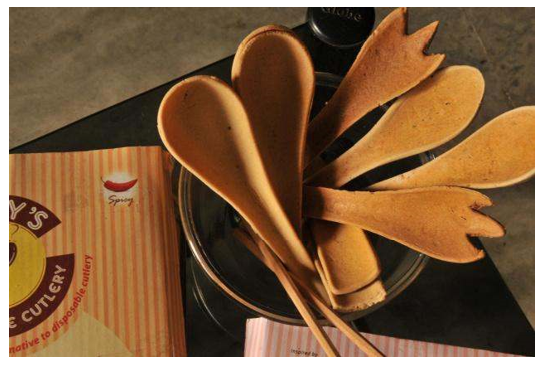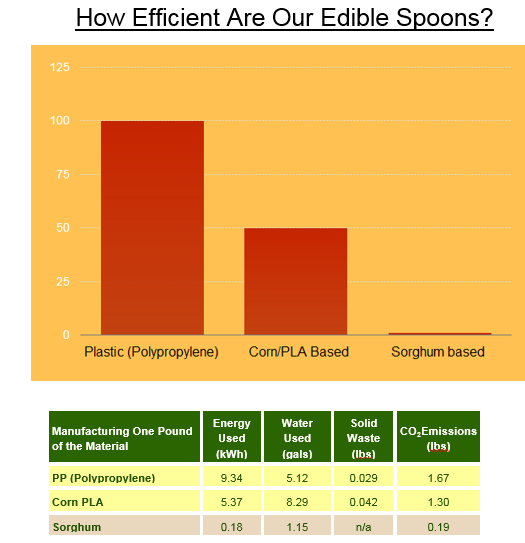
- Sustainable Planet -
- 4mins -
- 984 views
Edible Cutlery: The Future of Eco Friendly Utensils?
Now you can use your cutlery and eat it too with these edible utensils designed and made in India to help fight plastic pollution.
Indian entrepreneur’s edible cutlery allows you to eat with them, then eat them!
BAKEYS’ was established in 2010 in Hyderabad, Andhra Pradesh, to provide an alternative to plastic disposable cutlery. Made of three flours: rice, wheat, and sorghum, in either sweet or plain, if you don’t want to eat them when you finish your meal, they are 100% compostable.
Entrepreneur who had to eat hard rotis hit upon the idea of edible cutlery
In 2005, while on a field visit to Mahabubnagar, a drought-prone district in Telangana, Southern India, entrepreneur Narayana Peesapaty ordered a jowar roti (millet bread) for lunch. He arrived late for his meal, but which time the roti had become cold and hard.
“I had to break the roti and scoop the dal and curry with its pieces, crunching into them. That was the eureka moment for me. If a two-dimensional spatula can work, then why not a three-dimensional spoon? I felt that I would be able to hit two birds in one shot,” Mr. Peesapaty told The Hindu.
The “birds” Mr. Peesapaty was referring to are two major issues: the need to reduce the acreage used for water-intensive rice cultivation in India, and the global problem of plastic pollution, as well as its misuse.
Though the material is not intrinsically bad, Mr. Peesapaty explained that plastics should not be used for handling food, since they contain chemicals with carcinogenic and neurotoxic properties that leach into what we eat.
Furthermore, plastic is often manufactured in a very unhygienic manner. Industrial lubrication is applied on the moulds to prevent them from sticking to products. These are wiped and not cleaned with proper wash. Nobody ever washes their plastic cutlery before using it, and would be putting this industrial contamination directly into their mouths.
Edible cutlery was his solution, and he founded a company called Bakeys to produce it. Mr. Peesapaty said, “As an agricultural scientist, I want this world to be a better place to live.” His wife, Pragyna Keskar, says the spoons are safe to eat and “taste like crackers.” Even if they are not eaten, they are safe to dispose of into the environment, as they are 100% biodegradable.
Source: The Hindu

Demand has outstripped supply for these ecological and nutritious utensils
In his home kitchen, Peesapaty tried making cutlery using different combinations of flour. When he finally got it right, he had difficulty finding a mould-maker. Then it was a struggle to find investors.
“Those were very bad days. Friends and relatives started avoiding me as I was asking them for money.” He told The Hindu. He sold some of his assets, including a house in Vadodara and a flat in Hyderabad. He used his savings. “We have seen the worst,” he recalled.
The couple raised more than ₹20 million ($300,000/€235,600) on their own; it was not until 2014 that they got a bank loan. In the meantime, his wife Pragyna Keskar had taken up casual jobs to supplement their income. “I share his passion for making edible spoons. So does his mother,” she said.
In 2016, Bakeys raised ₹18.7 million by crowdfunding on Kickstarter and more than ₹2.4 million on Ketto, thanks to a social media film that went viral.
Bakeys now employs eleven people — eight at the factory on the outskirts of Hyderabad, besides an accountant, a web designer and a researcher. It produces 10,000 spoons a day using 500 kg of jowar (sorghum) flour and an equal quantity of rice flour and other ingredients. More than 120 countries are currently trying to place orders, however Bakeys is not currently accepting them. The company are looking at decreasing the current waiting period of two months.
“Our website is meant to take orders but it has stopped as we can’t supply,” Ms. Keskar said, adding that the mismatch between demand and supply is huge. The company’s largest orders come from the United States, United Kingdom, Canada, Australia, Dubai, Singapore, Taiwan and China.
Source: The Hindu


